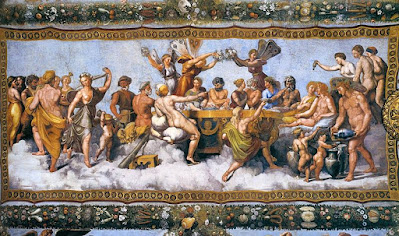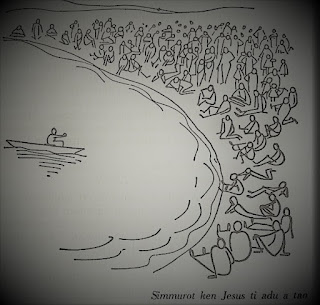From Fist to Feast: Apocalyptic Imagination of the Prophet
 |
| The Wedding Banquet of Cupid and Psyche (1517) by Raphael. Villa Farnesina, Rome credit here |
From Fist to Feast
We read of the Prophet Isaiah's Protest Song last Sunday. We can imagine him raising his "FIST" against YWHW's beloved vineyard for producing wild grapes aka injustice and oppression, like how He shakes his "fist at the mount of daughter Zion, the hill of Jerusalem!" (Isa 10:32).
This Sunday (10/11/20) the Prophet speaks of a "FEAST" in Isaiah 25 in the First Reading.
The Isaiah Apocalypse
Isaiah chapters 24-27 has a unique literary style from the rest of the book, that is APOCALYPTIC.
It was the German biblical scholar, Bernhart Duhm (1892) who singled out this section and dubbed "the Isaiah Apocalypse". When we compare this with other apocalyptic literature in the Bible (Daniel, 1 Enoch, Revelation), it shares similar elements:
- the resurrection of the dead 26:19
- the abolition of death 25:8 (see First Reading)
- the imprisonment of the heavenly host 24:22
- eschatological Feast 25:6 (see First Reading and the Gospel Matthew 22
Recent scholarship, however, doubts whether this section is indeed apocalyptic and this to be singled out (e.g. Blenkinsopp). There are major apocalyptic elements missing in it: periodization of history, heavenly journeys, dualistic way of thinking. The function of this section is not also alien to what it precedes, e.g., the Day of the Lord that would fall upon the earth (ERETZ) and the entire world (TEBEL) in 13:5,11: 18:3.
In the Bible, apocalyptic imagination could arise out of a particular political crisis like persecution: e.g. Antiochus Epiphanes IV during the time of the composition of the Book of Daniel; or the Roman Emperor Domitian or Nero in Revelation.
In the so-called Isaiah Apocalypse, it is difficult to relate it to any specific crisis.
The Feast
Two interesting elements though call for short commentary: the Feast and the defeat of death.
Unlike in Ezekiel and Revelation which a triumphal feast but gruesome, the banquet in Isaiah on Mount Zion is extraordinarily sumptuous: "a banquet of rich food, a banquet of wine well-aged, of food rich in marrow, of well-aged strained clear" (Blenkinsopp's translation).
It is God himself who prepares the Feast.
The Feast is festive as it would be the end of mourning signified by God destroying the shroud which wrapped the people (for burial). The Lord would destroy Death. The Hebrew for "destroy" is BALA' which means, the Lord will "swallow" Death.
In the ancient Canaanite myth, it is MOT, the personification of Death, that swallows up the god BAAL.
As Death is now defeated, the LORD himself, in an affectionate way, would "|wipe the tears in every face."
Perhaps, there is an intimation here of resurrection or eternal life, though it is not that apparent (as in the later books of the Old Testament: Daniel 12, 2 Maccabees, and Wisdom of Solomon.
We can think that Death here is a metaphor for everything that is wrong in human life.
We can also imagine that because of that sharing (SHELAMIM in Hebrew or "communion") with the Food of God, Death loses its power.
The idea of a divine food (or food of the angels) connected to immortality would, later on, be developed by the author of the Wisdom of Solomon. I have written an essay on this some years ago which you can read from here (click).
Such a concept may be intimated in this Sunday's Gospel on the Parable of the Wedding Banquet (Matthew 22)
It is not so difficult to for Christians, later on, to give a "fuller meaning" (sensus plenior) of the Feast in Isaiah as an anticipation of the Eucharist, recalling what Jesus said at the Last Supper: "I tell you, from now on I shall not drink this fruit of the vine until the day when I drink it with you new in the kingdom of my Father” (Matthew 26:29).


Comments
Post a Comment